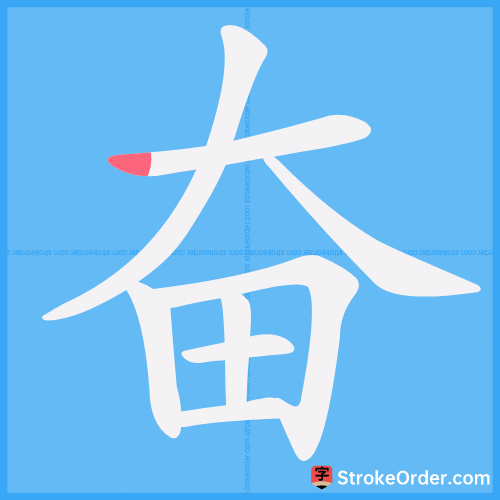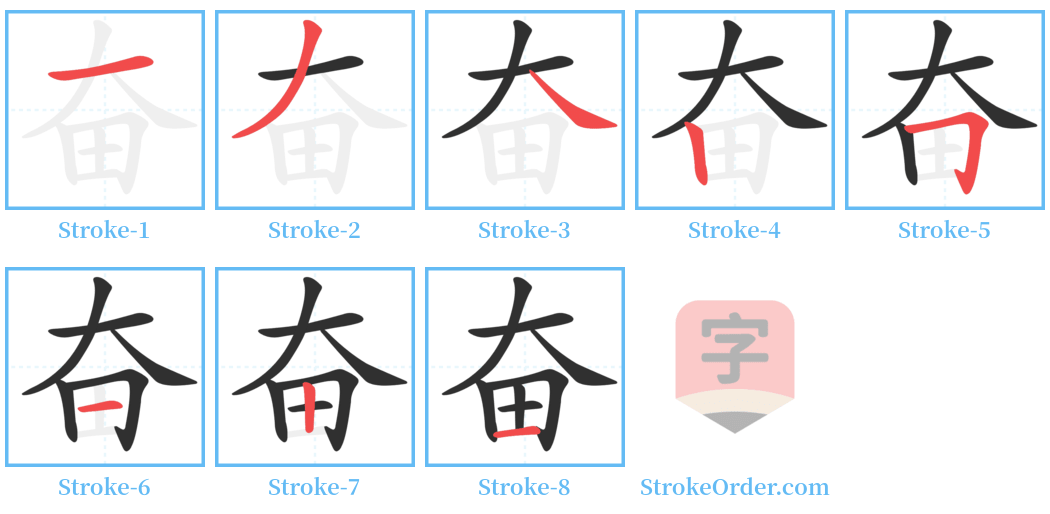奋 Stroke Order
Animated Stroke Order of 奋

Stroke Order Diagrams for 奋

Step-by-Step Handwriting Guide for 奋

Learn to Write Chinese Characters with Video Tutorials
Watch the video of writing the Chinese character "奋", learn the correct stroke order (笔顺) of the character "奋", and master the standard way of writing the character "奋".
Free Printable Handwriting Practice with Stroke Order: 奋
Printable Writing Practice Worksheet of "奋" in Portrait Orientation (Tian Zi Ge)

Printable Writing Practice Worksheet of "奋" in Landscape Orientation (Tian Zi Ge)

Information of 奋
Pinyin
fèn
Radical
大
Strokes
8 strokes
Usage
★★★★★
Definition
exert oneself
奋 fèn
1. 鸟张开并振动翅膀。
(A bird spreads and flaps its wings.)
2. 振作,鼓劲,振动。
(To perk up, to motivate, to shake.)
3. 提起,举起。
(To lift, to raise.)
1. 鸟张开并振动翅膀:~飞。~翅。
(A bird spreads and flaps its wings: ~flying. ~wings.)
2. 振作,鼓劲,振动:~起。~力。~勇。~不顾身。振~。勤~。兴~。
(To perk up, to motivate, to shake: ~up. ~effort. ~courage. ~without regard for oneself. ~shaking. ~diligently. ~flourishing.)
3. 提起,举起:~臂。~袂(举袖,形容奋发的样子)。~笔疾书。
(To lift, to raise: ~arms. ~sleeves (raising sleeves, depicting a vigorous appearance). ~pen for rapid writing.)
奮 fèn
[动]
【本义】: 鸟类振羽展翅
(Original meaning: The act of birds spreading their feathers and wings.)
【造字法】: 会意。金文字形,中间是“隹”(鸟); 外面象鸟振翅欲飞之势; 下面是“田”,表示空旷的田野。
(Word formation: Pictophonetic. The character has "隹" (bird) in the center; the outer form resembles the motion of a bird flapping its wings; underneath is "田", which represents an open field.)
同本义 ([En.] (said of a bird) to take wing)
1. 《说文》:奮,翚也。
(From Shuowen: "奋" means to soar.)
2. 张衡《西京赋》:奋隼归凫。
(From Zhang Heng: "... the falcon soars back...")
3. 《淮南子·原道》:羽翼奋也。
(From Huainanzi: "The wings fly.")
4. 《尔雅·释鸟》:雉绝有力奋,鸡绝有力奋。
(From Erya: "The pheasant is strong and can soar, the chicken is strong and can soar.")
5. 《诗·邶风·柏舟》:不能奋飞。
(From the Book of Songs: "Unable to soar.")
6. 《虞初新志·秋声诗自序》:于是宾客无不变色离席,奋袖出臂。
(From Yuchuxin Zhi: "The guests all turned pale and left their seats, waving their sleeves.")
7. 《聊斋志异·促织》:虫暴怒,直奔,遂相腾击,振奋作声。
(From Liaozhai Zhiyi: "The insect was furious, charging straight ahead and making a sound.")
又如: 奋翅(振翼起飞);奋翼(振翼高飞);奋翔(振翼高飞);奋鳞(龙腾飞);奋翮(展翅,振羽)
(Examples: to flap wings (to take off); to soar with wings; to soar; to fly; to spread wings.)
鼓起劲来,振作 ([En.] raise; exert oneself; act vigorously)
1. 《广雅·释言》:奋,振也。
(From Guangya: "奋" means to shake vigorously.)
2. 清· 徐珂《清稗类钞·战事类》:拔刀奋起,率众袭之。
(From Xu Ke: "Drawing swords and rising up, leading the crowd to attack.")
3. 汉· 贾谊《过秦论》:及至始皇,奋六世之余烈。
(From Jia Yi: "When it comes to the First Emperor, he exerted the legacy of six generations.")
又如: 奋烈(振奋威武);奋信(振奋伸张);奋武扬威(振奋勇气,施展威风);奋气(奋发振作)
(Examples: fiercely motivated; to invigorate; to display might; to uplift one's spirit.)
震动 ([En.] shake)
1. 《易·豫》:雷出地奋。
(From Yijing: "Thunder arises from the ground.")
2. 《广雅》:奋,动也。
(From Guangya: "奋" means to move.)
又如: 奋首(摇头,表示疲困);奋髯(抖动胡须);奋蹄(振蹄)
(Examples: to shake one's head (to show fatigue); to shake one's beard; to lift one's hooves.)
奋力;施展;发挥 ([En.] dash ahead; put to good use)
1. 《史记·乐书》:奋至德之光。 集解:“发也。”
(From Shiji: "Exert the light of virtue.")
2. 《诗·大雅·常武》:王奋厥武。
(From Shijing: "The king exerts his might.")
3. 《史记·平原君虞卿列传》:岂其士卒众多哉,诚能据其势而奋其威。
(From Shiji: "Were there not many soldiers, indeed they could leverage their power.")
又如: 奋张(有力地伸展、张开);奋末(四肢用力)
(Examples: to stretch forcefully; to exert effort with limbs.)
挥动;举起;舞动 ([En.] wield)
1. 《史记·张耳陈余列传》:陈王奋臂,为天下倡始。
(From Shiji: "The king Chen raised his arms, taking the initiative for the world.")
2. 明· 魏禧《大铁椎传》:众贼环而进,客奋椎左右击,人马仆地。
(From Wei Xi: "Many thieves surrounded and pressed in, and the guest swung his hammer to strike left and right.")
3. 马中锡《中山狼传》:遂鼓吻奋爪以向先生。
(From Ma Zhongxi: "He then swung his claws towards the teacher.")
又如: 奋臂(有力地举臂,表示振奋);奋袂(举袖,挥袖,形容振奋);奋笔(提笔疾书);奋戈(使劲挥舞干戈)
(Examples: to raise arms vigorously (to show enthusiasm); to raise sleeves; to wield a pen for rapid writing; to wield a spear vigorously.)
to dash on bravely with no thought of personal safety (idiom); undaunted by dangers / regardless of perils
lit. lone army putting up a brave fight (idiom) / fig. (of a person or group of people) struggling hard without support
Input Method for 奋
Pinyin
fen4
Wubi
dlf
Cangjie
kw
Zhengma
gdki
Four Corner
40608
Unicode
U+594b
Same Pronunciation Characters